Perdue Farms Bundle
Can Perdue Farms Continue to Thrive in the Evolving Food Industry?
Perdue Farms, a century-old giant in the food and agriculture sector, has consistently demonstrated the importance of a well-defined growth strategy. From its humble beginnings selling table eggs to becoming a leading poultry provider, the company's journey reflects a commitment to quality and adaptation. The original vision, rooted in hard work and dedication, has paved the way for a remarkable transformation.
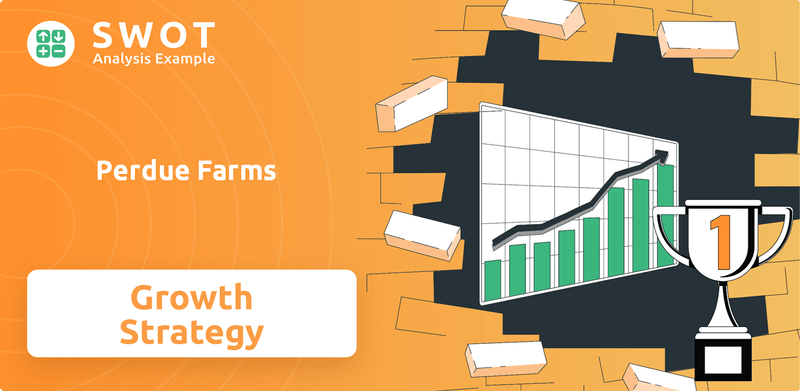
This deep dive into Perdue Farms SWOT Analysis will explore the company's strategic planning process, examining its expansion plans, innovation in poultry, and financial performance review. We'll analyze the chicken market, considering agricultural business development and poultry industry trends to understand Perdue Farms' competitive landscape and its long-term goals. Furthermore, we'll evaluate Perdue Farms' sustainability initiatives and its impact on local communities, providing a comprehensive Perdue Company Analysis for investors and industry professionals alike.
How Is Perdue Farms Expanding Its Reach?
Perdue Farms is actively pursuing several expansion initiatives to broaden its market reach and diversify its offerings. These initiatives are strategically designed to capitalize on emerging opportunities within the poultry industry and agricultural business development. The company's growth strategy focuses on both organic and conventional markets, reflecting a commitment to meeting diverse consumer preferences and poultry industry trends.
A key element of Perdue's expansion plans involves significant investments in its infrastructure and supply chain. This includes expanding its organic grain operations, developing new product lines, and enhancing its logistics capabilities. The company's strategic planning process is geared towards sustainable growth and adapting to the evolving demands of the chicken market.
Perdue's focus on innovation and sustainability is evident in its recent initiatives. These efforts are aimed at strengthening its position in the competitive landscape and ensuring long-term financial performance. The company's approach reflects a comprehensive understanding of consumer behavior analysis and the importance of adapting to market changes.
In November 2024, Perdue AgriBusiness announced a $30 million investment to open an organic grain receiving and storage facility in Maryland. This facility will support the growth of organic poultry production. The investment will create over 25 new jobs, further enhancing the company's supply chain management.
Perdue continuously launches new products to meet consumer demands. In November 2024, the company introduced the 'Chiclucken' for Thanksgiving. Moreover, Perdue is championing new standards for 'pasture-raised' labeling, enhancing transparency and catering to consumer interest in ethically raised products. This follows the acquisition of Pasturebird in 2020.
Perdue is investing in its supply chain for greater sustainability. In November 2024, the company welcomed the 'Miss Madeline,' a new liquid barge. The company also supports food insecurity initiatives, delivering over 67,000 meals to the Food Bank of Delaware in January 2024. This demonstrates Perdue's commitment to its impact on local communities.
Perdue is actively promoting and implementing sustainable practices. The company's efforts to update the USDA's definition of 'pasture-raised' labeling are a testament to its commitment to ethical farming. These initiatives align with the company's long-term goals and investment strategies, ensuring a responsible and consumer-focused approach.
Perdue Farms' expansion strategy is multifaceted, encompassing investments in organic grain, new product development, and supply chain improvements. These initiatives aim to strengthen the company's market position and address the evolving needs of consumers. These efforts are detailed in the Marketing Strategy of Perdue Farms.
- Expanding organic grain operations to meet rising demand.
- Launching innovative products like 'Chiclucken' to cater to consumer preferences.
- Investing in supply chain efficiency and sustainable practices.
- Advocating for clearer labeling standards to enhance transparency.
Perdue Farms SWOT Analysis
- Complete SWOT Breakdown
- Fully Customizable
- Editable in Excel & Word
- Professional Formatting
- Investor-Ready Format
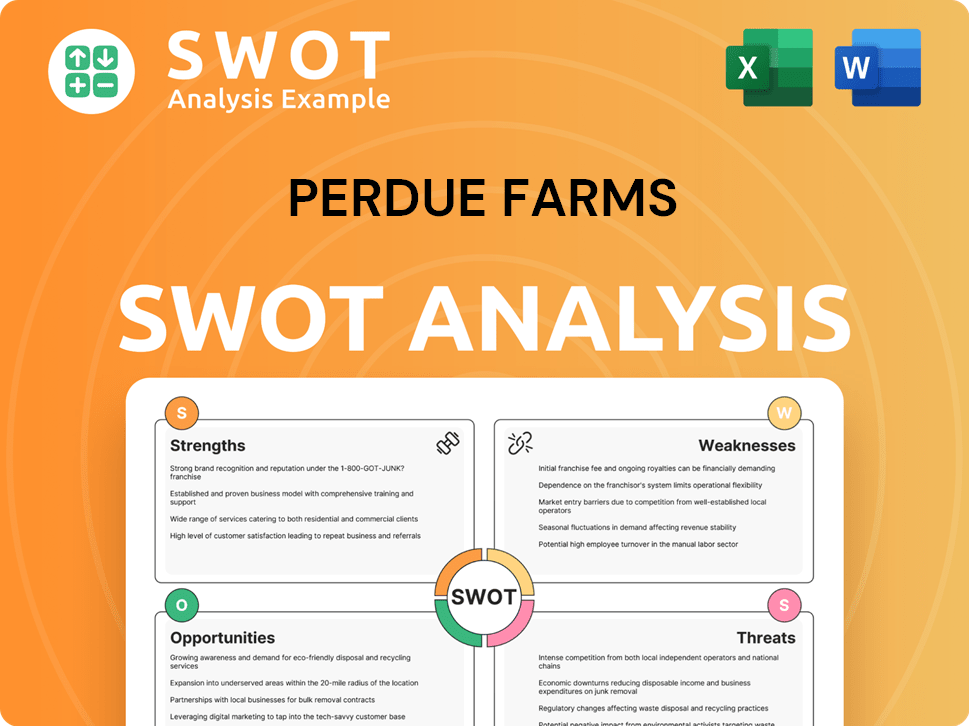
How Does Perdue Farms Invest in Innovation?
Perdue Farms is actively leveraging innovation and technology to propel its growth strategy and secure its future prospects. This approach is central to the company's strategic planning process, focusing on operational efficiency, sustainability, and enhanced product quality. The company's investments in digital transformation and cutting-edge technologies reflect its commitment to adapting to evolving poultry industry trends and consumer demands.
The company's initiatives are designed to improve various aspects of its operations, from animal care to supply chain management. These efforts are aimed at enhancing its competitive landscape and ensuring long-term financial performance. By embracing innovation, Perdue Farms aims to maintain its position as a leader in the chicken market and broader agricultural business development.
Digital transformation is a key component of Perdue Farms' innovation strategy. The company is implementing digital solutions across its finance, foods, and agribusiness segments. This shift from manual processes to automated solutions is designed to boost operational efficiency and improve decision-making. For example, the adoption of Dataiku has enabled the automation of USDA data collection and reporting, significantly reducing manual effort.
Dataiku adoption has automated USDA data tasks, saving over 6 hours monthly. This automation allows the food safety team to focus on analysis and insights. Tasks that previously took days are now completed in hours.
Perdue Farms has adopted 'NestBorn' on-farm hatching technology. This innovation reduces stress and improves chick quality. European studies show farms using this technology are 5.6 times more likely to be antibiotic-free.
The company partnered with SustainaBase to measure and manage its carbon footprint. This collaboration aims to provide transparency on the environmental impact. Perdue AgriBusiness entered a carbon insetting agreement with Eion to remove CO₂.
Perdue Farms collaborates with companies like Dataiku, SustainaBase, and Eion. These partnerships support operational excellence and environmental stewardship. The carbon insetting agreement with Eion aims to remove an estimated 3,500 metric tons of CO₂.
Perdue Farms is the first major U.S. poultry producer to implement 'NestBorn' technology. This technology allows chicks to hatch in their rearing environment. It eliminates hatchery processing and transport.
The company is working to accurately measure, monitor, and manage its carbon footprint. This includes Scope 3 emissions. The collaboration with SustainaBase helps meet customer sustainability goals.
Perdue Farms' focus on innovation is evident in its adoption of advanced technologies. These technologies not only improve operational efficiency but also contribute to sustainability and animal welfare, key aspects of Perdue Farms' long-term goals.
- Digital Transformation: Implementing automated solutions to enhance operational efficiency and decision-making.
- 'NestBorn' Technology: Utilizing on-farm hatching to improve chick health and support antibiotic-free commitments.
- Sustainability Partnerships: Collaborating with SustainaBase and Eion to measure and reduce carbon emissions.
- Data Analytics: Using tools like Dataiku to streamline data collection and analysis, improving insights and reducing manual effort.
Perdue Farms PESTLE Analysis
- Covers All 6 PESTLE Categories
- No Research Needed – Save Hours of Work
- Built by Experts, Trusted by Consultants
- Instant Download, Ready to Use
- 100% Editable, Fully Customizable
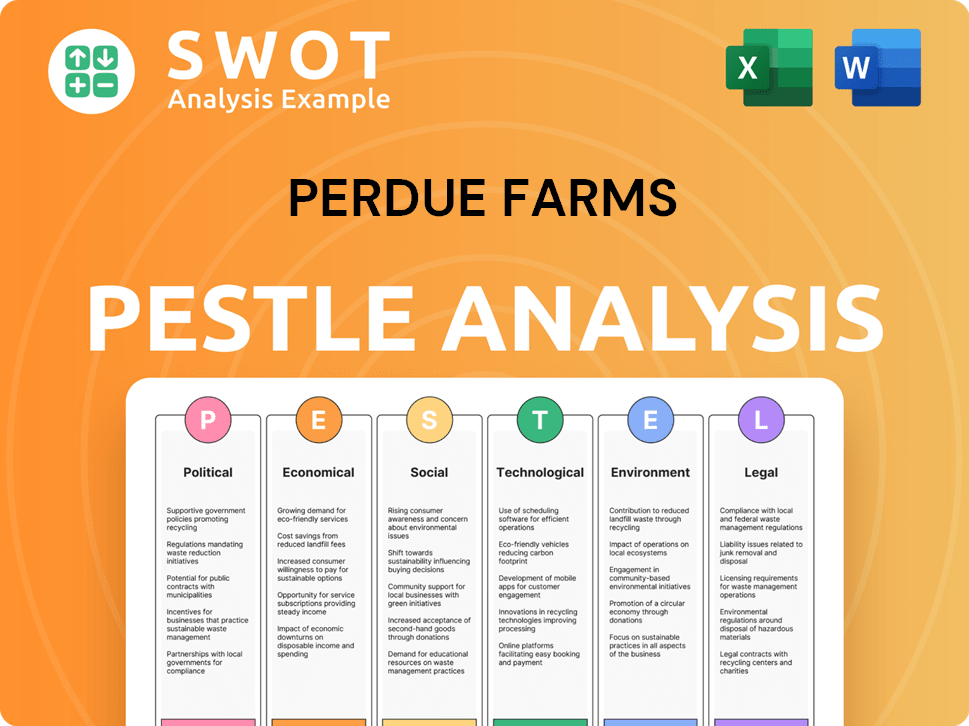
What Is Perdue Farms’s Growth Forecast?
Analyzing the financial outlook for Perdue Farms requires an understanding of its strategic investments and commitment to operational excellence. As a privately held entity, detailed financial disclosures are not publicly available. However, available data and strategic initiatives offer valuable insights into its financial health and growth trajectory. The company's focus on sustainability and supply chain stability further supports its long-term financial prospects.
Perdue Farms' financial strategy is closely tied to its investments in infrastructure and its commitment to its network of farmers and ranchers. These investments are crucial for maintaining a stable supply base and adapting to evolving consumer demands. The company's emphasis on environmental stewardship, as detailed in its 2024 Company Stewardship Report, also contributes to its financial sustainability by reducing operational costs and enhancing its brand reputation, which is essential for long-term success in the competitive poultry industry.
In February 2025, Perdue Farms reported revenue of $10.3 billion, reflecting its significant market presence and operational scale. This financial performance is supported by strategic investments and a focus on operational efficiency. The company's ability to adapt to market trends and consumer preferences will be key to its continued growth and success. For more context, you can read about the Brief History of Perdue Farms.
Perdue Farms is actively investing in infrastructure to support its growth. The company announced a $30 million organic grain receiving and storage facility in November 2024. These investments are designed to expand its high-demand product lines.
The company is focused on environmental stewardship, which contributes to long-term financial sustainability. In FY24, Perdue Farms diverted 96.8% of solid waste from landfills. Perdue Farms reduced greenhouse gas intensity by 3.6% in FY24.
Perdue Farms supports a network of 9,000 farmers and ranchers. The company modifies business relationships with contracts that reward care and welfare, contributing to a stable supply base. This approach supports the company's agricultural business development.
The company's revenue in February 2025 was $10.3 billion. This indicates a strong market position and operational scale. This financial performance is supported by strategic investments and a focus on operational efficiency.
Perdue Farms Business Model Canvas
- Complete 9-Block Business Model Canvas
- Effortlessly Communicate Your Business Strategy
- Investor-Ready BMC Format
- 100% Editable and Customizable
- Clear and Structured Layout
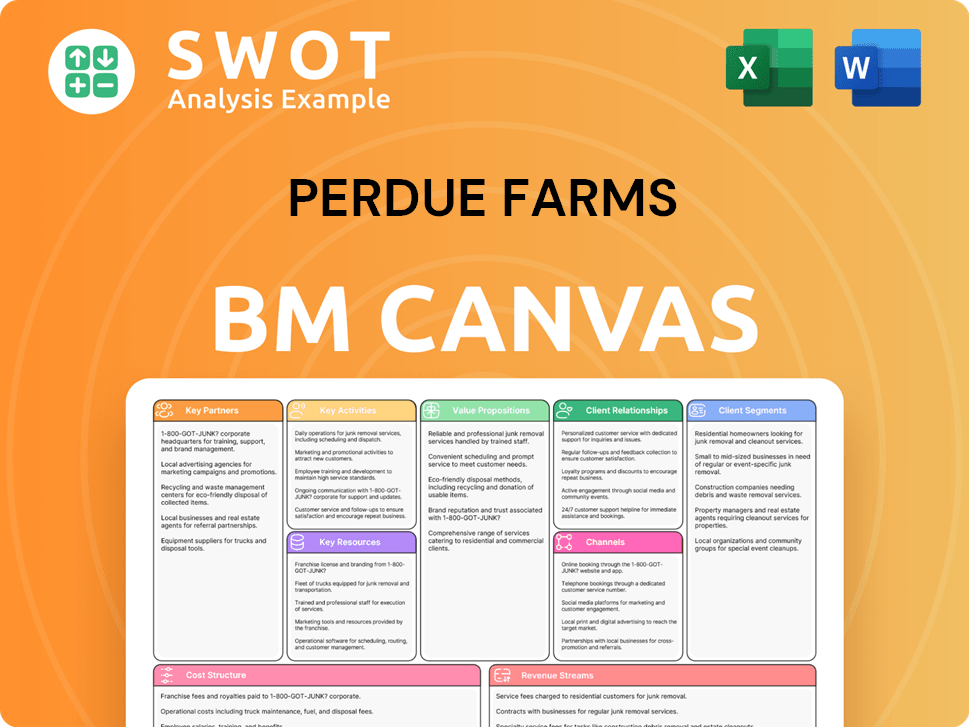
What Risks Could Slow Perdue Farms’s Growth?
The path of Owners & Shareholders of Perdue Farms toward growth is not without its hurdles. Several risks and obstacles could potentially impede the company's strategic objectives and future prospects. These challenges span market dynamics, regulatory pressures, and operational vulnerabilities.
Competition within the poultry industry remains fierce, creating a continuous need for innovation and efficiency. Fluctuations in commodity prices, such as those for grain, can also significantly impact profitability. The company's vertical integration strategy helps to mitigate some of these risks, but exposure to market volatility persists.
Compliance with regulations and managing supply chain disruptions are critical for sustained success. The company must navigate stringent regulations regarding food safety, animal welfare, and environmental impact, while also ensuring a resilient supply chain. Addressing these challenges is essential for maintaining a strong market position and achieving long-term growth.
The poultry industry is highly competitive, with major players like Tyson Foods constantly vying for market share. This competition requires continuous product development and operational efficiency to maintain a competitive edge. Perdue Farms's ability to differentiate its offerings and adapt to changing consumer preferences is crucial.
Fluctuations in the prices of key feed ingredients like corn and soybeans can significantly affect Perdue Farms's profitability. These price swings are influenced by various factors, including weather patterns, global demand, and geopolitical events. Managing these risks requires effective hedging strategies and supply chain management.
The food and agriculture industry faces stringent regulations regarding food safety, animal welfare, and environmental impact. Compliance with these regulations requires significant investment in infrastructure, processes, and training. Failure to meet these standards can result in costly penalties and reputational damage.
Disruptions in the supply chain, such as disease outbreaks in poultry or livestock, can severely impact production and profitability. Managing these risks involves robust biosecurity measures, monitoring programs, and contingency plans. The 2025 U.S. Department of Labor agreement highlights the importance of ethical labor practices.
While Perdue Farms's sustainability initiatives are beneficial for long-term resilience, they require ongoing capital and operational adjustments. Investments in practices like enhanced rock weathering and tracking carbon emissions, although essential, represent substantial commitments. These investments are critical for meeting evolving consumer and industry standards.
Changes in consumer preferences, such as the growing demand for organic and sustainably sourced products, can pose both challenges and opportunities. Adapting to these trends requires innovation in product development and marketing. Staying ahead of these shifts is crucial for maintaining market relevance and driving growth.
Perdue Farms's financial performance is directly influenced by market dynamics, commodity prices, and operational efficiency. The company's ability to manage costs, optimize production, and adapt to changing market conditions is key. A comprehensive financial review would include analyzing revenue, profitability, and cash flow metrics.
Understanding Perdue Farms's market share within the poultry industry is crucial for assessing its competitive position and growth potential. Market share analysis involves comparing the company's sales and revenue to those of its competitors. This analysis helps identify areas for improvement and opportunities for expansion.
Effective supply chain management is essential for minimizing disruptions and maintaining operational efficiency. This includes managing relationships with suppliers, optimizing logistics, and implementing robust risk management strategies. A well-managed supply chain is critical for ensuring product availability and controlling costs.
Understanding consumer preferences and behaviors is crucial for developing successful marketing strategies and new products. This involves analyzing market trends, conducting consumer surveys, and monitoring purchasing patterns. Adapting to changing consumer demands is essential for maintaining market relevance and driving growth.
Perdue Farms Porter's Five Forces Analysis
- Covers All 5 Competitive Forces in Detail
- Structured for Consultants, Students, and Founders
- 100% Editable in Microsoft Word & Excel
- Instant Digital Download – Use Immediately
- Compatible with Mac & PC – Fully Unlocked
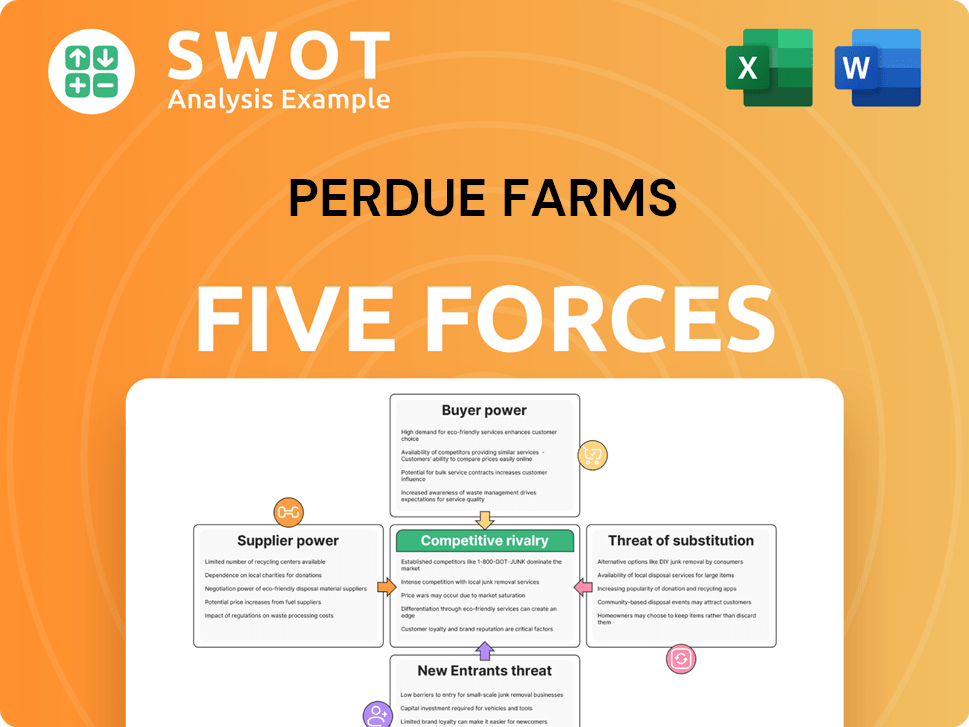
Related Blogs
- What are Mission Vision & Core Values of Perdue Farms Company?
- What is Competitive Landscape of Perdue Farms Company?
- How Does Perdue Farms Company Work?
- What is Sales and Marketing Strategy of Perdue Farms Company?
- What is Brief History of Perdue Farms Company?
- Who Owns Perdue Farms Company?
- What is Customer Demographics and Target Market of Perdue Farms Company?
Disclaimer
All information, articles, and product details provided on this website are for general informational and educational purposes only. We do not claim any ownership over, nor do we intend to infringe upon, any trademarks, copyrights, logos, brand names, or other intellectual property mentioned or depicted on this site. Such intellectual property remains the property of its respective owners, and any references here are made solely for identification or informational purposes, without implying any affiliation, endorsement, or partnership.
We make no representations or warranties, express or implied, regarding the accuracy, completeness, or suitability of any content or products presented. Nothing on this website should be construed as legal, tax, investment, financial, medical, or other professional advice. In addition, no part of this site—including articles or product references—constitutes a solicitation, recommendation, endorsement, advertisement, or offer to buy or sell any securities, franchises, or other financial instruments, particularly in jurisdictions where such activity would be unlawful.
All content is of a general nature and may not address the specific circumstances of any individual or entity. It is not a substitute for professional advice or services. Any actions you take based on the information provided here are strictly at your own risk. You accept full responsibility for any decisions or outcomes arising from your use of this website and agree to release us from any liability in connection with your use of, or reliance upon, the content or products found herein.